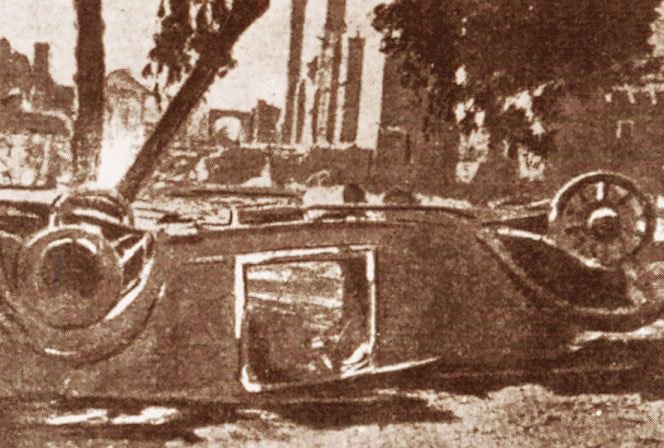
Το πυρπολημένο Κυβερνείο.
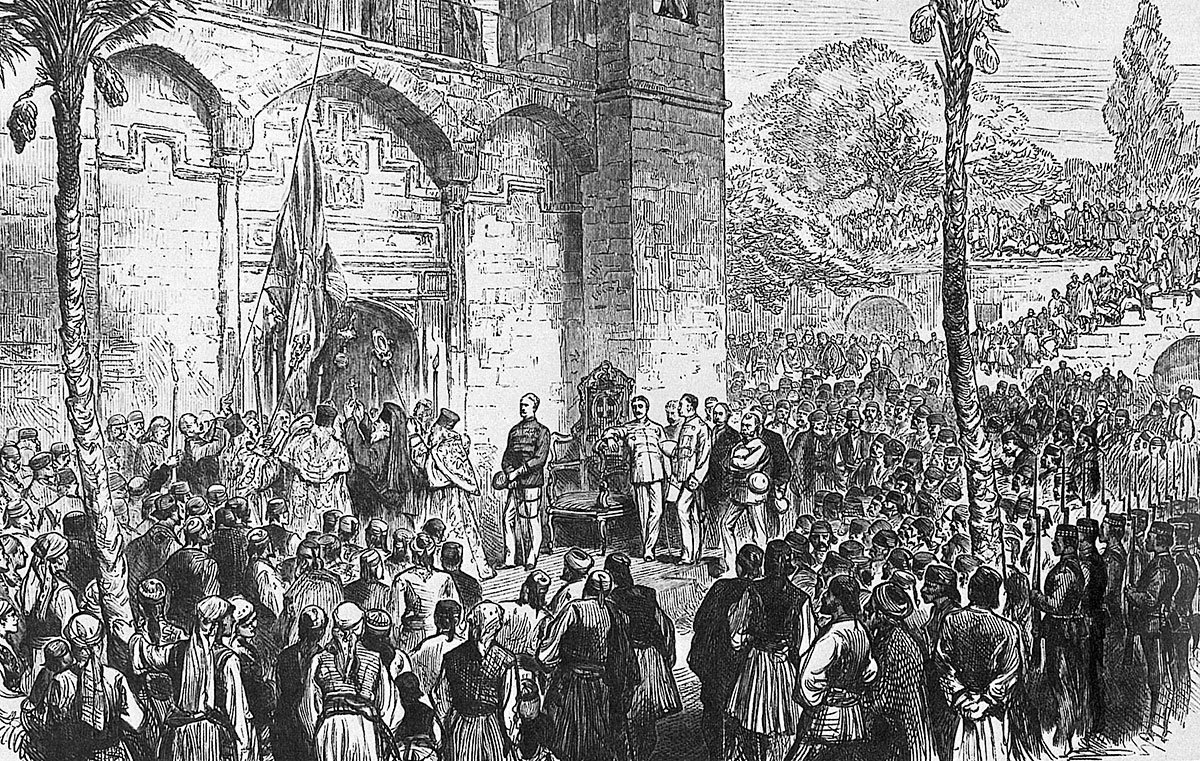
Ενθρονισμός των 'Αγγλων και δοξολογία. Ευλογίες για τη σημαία τους.
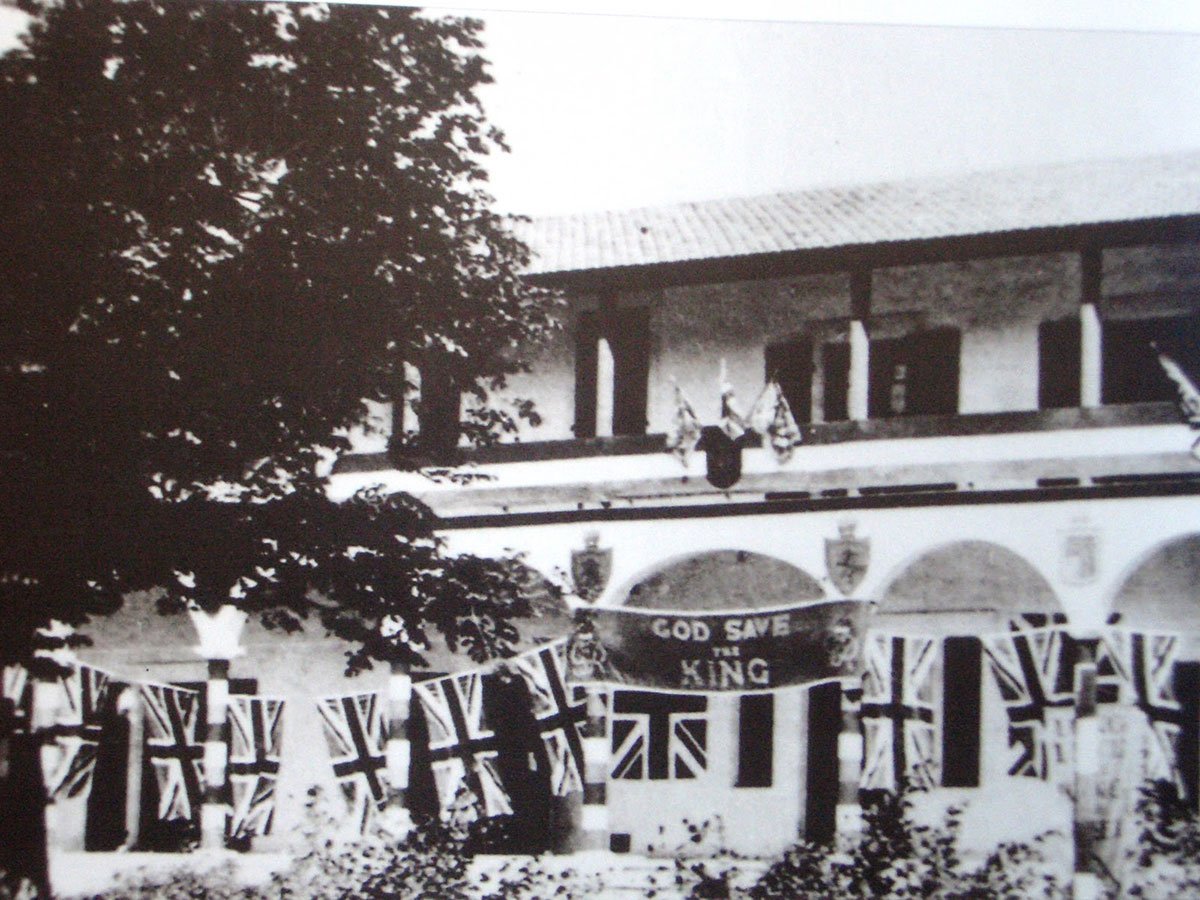
Το σπίτι του άγγλου Διοικητή πριν πυρποληθεί. Εκεί στεγάζεται από το 2011 το Παττίχειο Δημοτικό Μουσείο του Δήμου Λεμεσού.
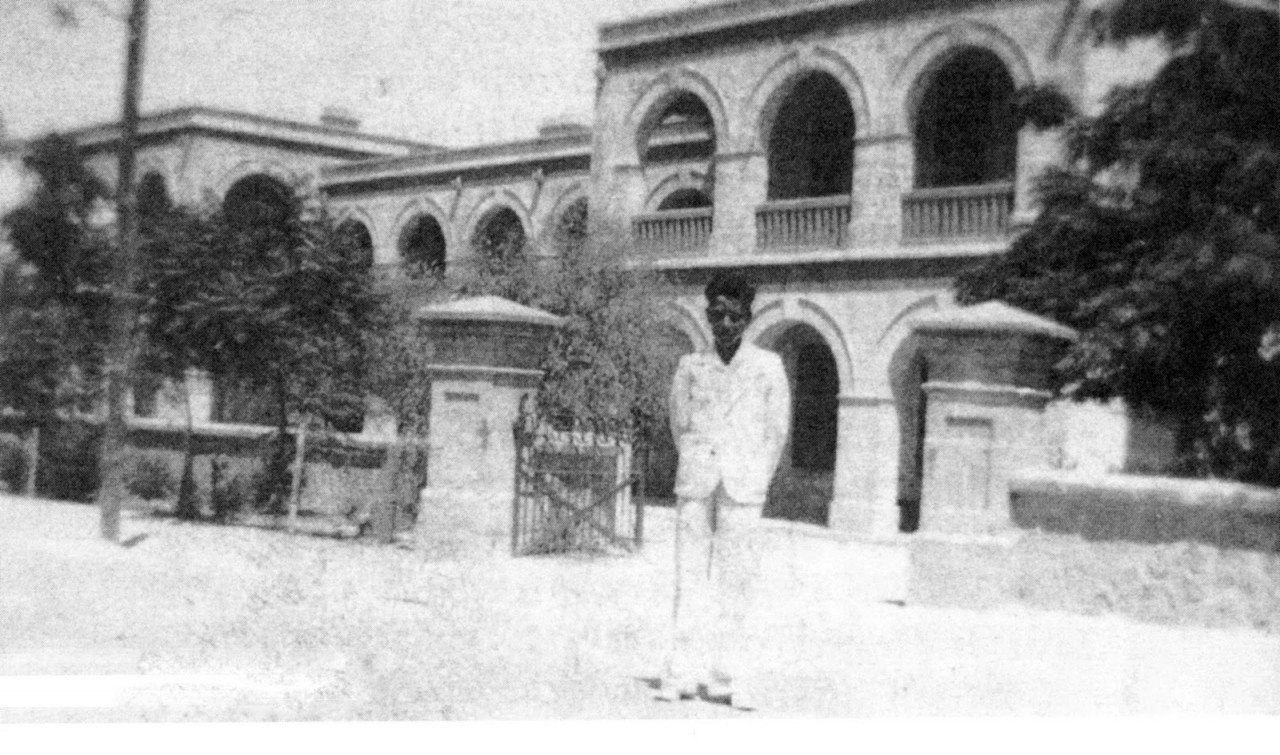
Το Διοικητήριο.
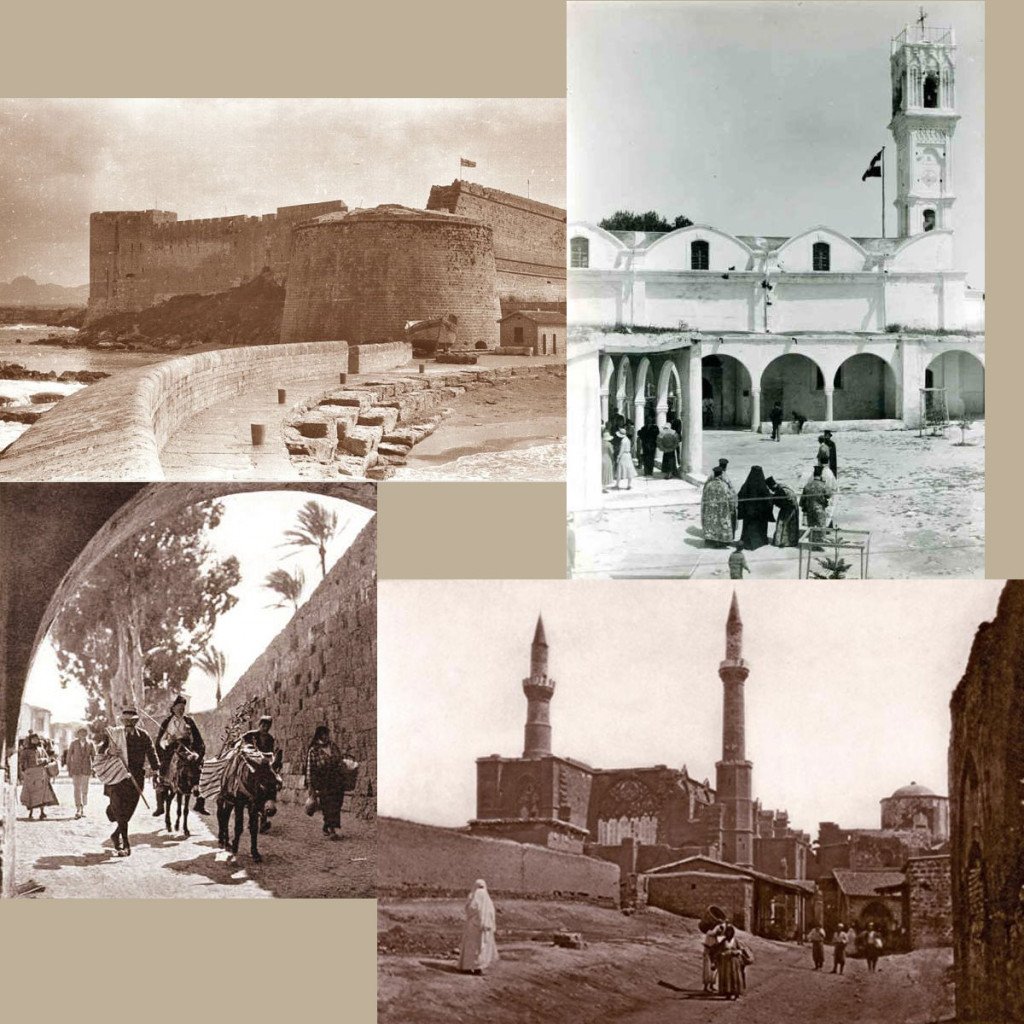
Η πύλη και το κάστρο της Κερύνειας με την αγγλική σημαία, εορτασμός στην εκκλησία Χρυσοπολίτισσα (φωτογραφία του Leopold Glaszner, γύρω στα 1925) και η συνοικία της Αγίας Σοφίας στη Λευκωσία.
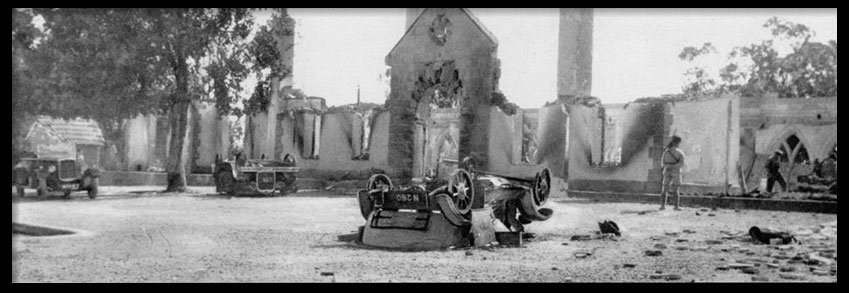
Ο,τι έμεινε από το Κυβερνείο.
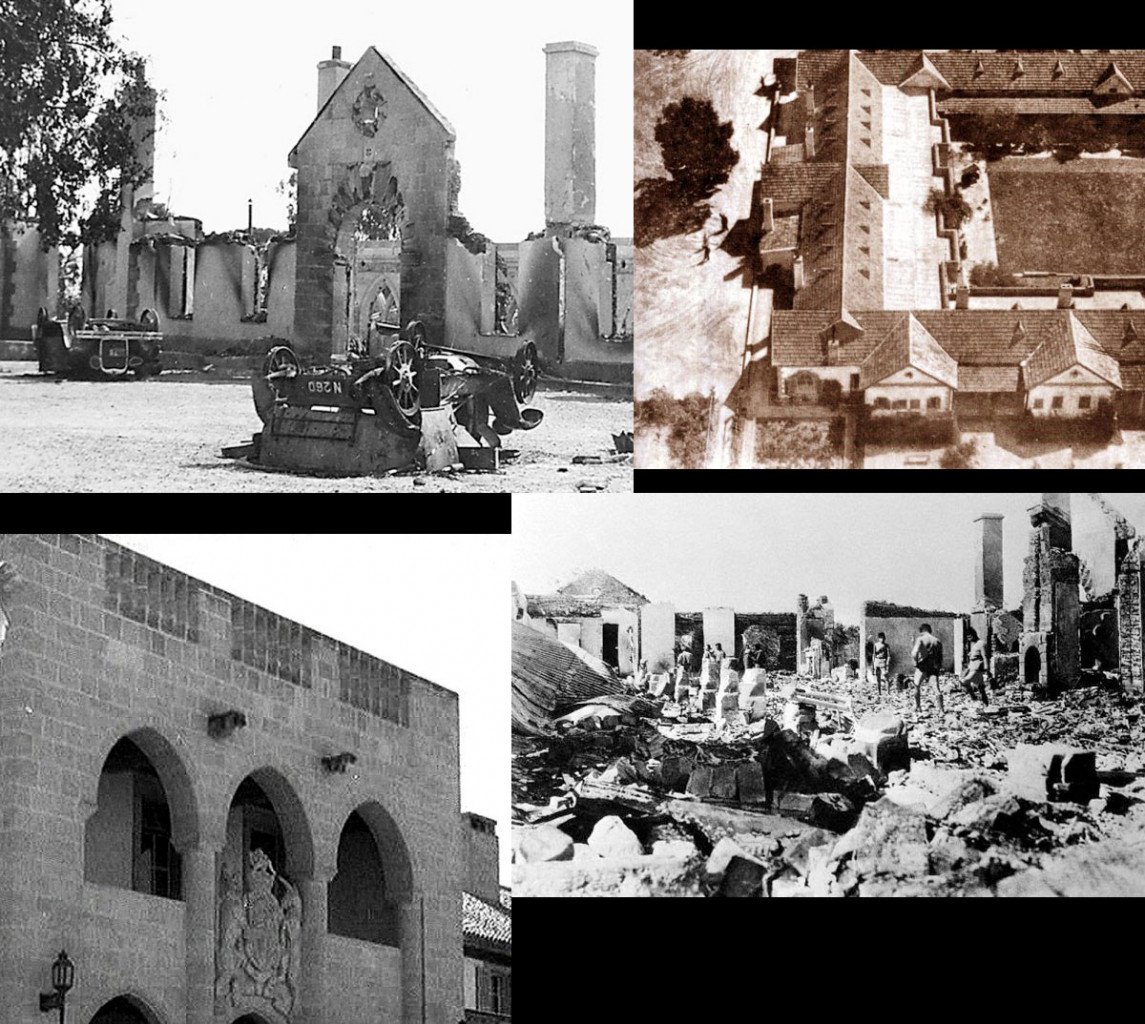
Το Κυβερνείο πριν και μετά τα Οκτωβριανά. Το 1955, ξανασχεδιάστηκε από τον αρχιτέκτονα Maurice Webb και στη θέση του βρίσκεται το σημερινό προεδρικό μέγαρο.
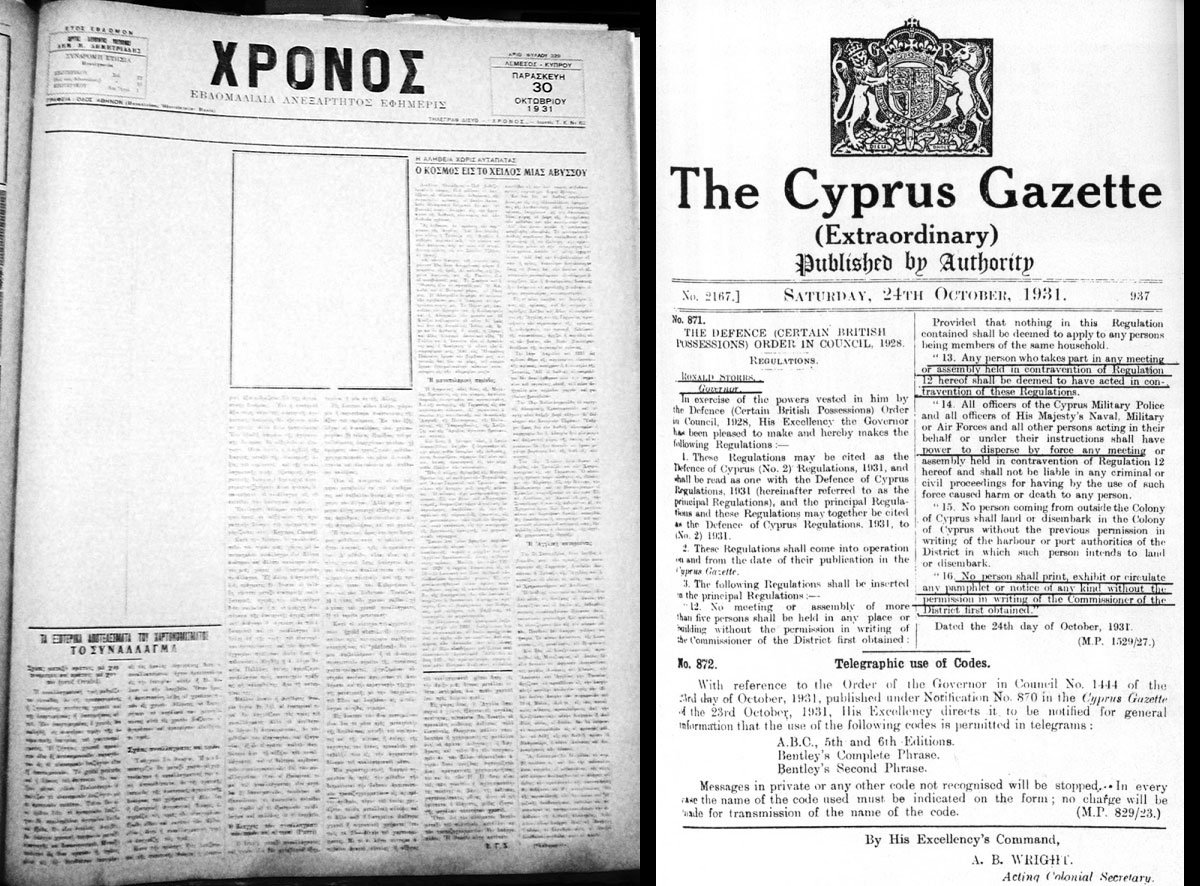
Λογοκρισία στην εφημερίδα Χρόνος και εξαγγελία εκτάκτων μέτρων από την βρετανική διοίκηση την επαύριο της εξέγερσης.
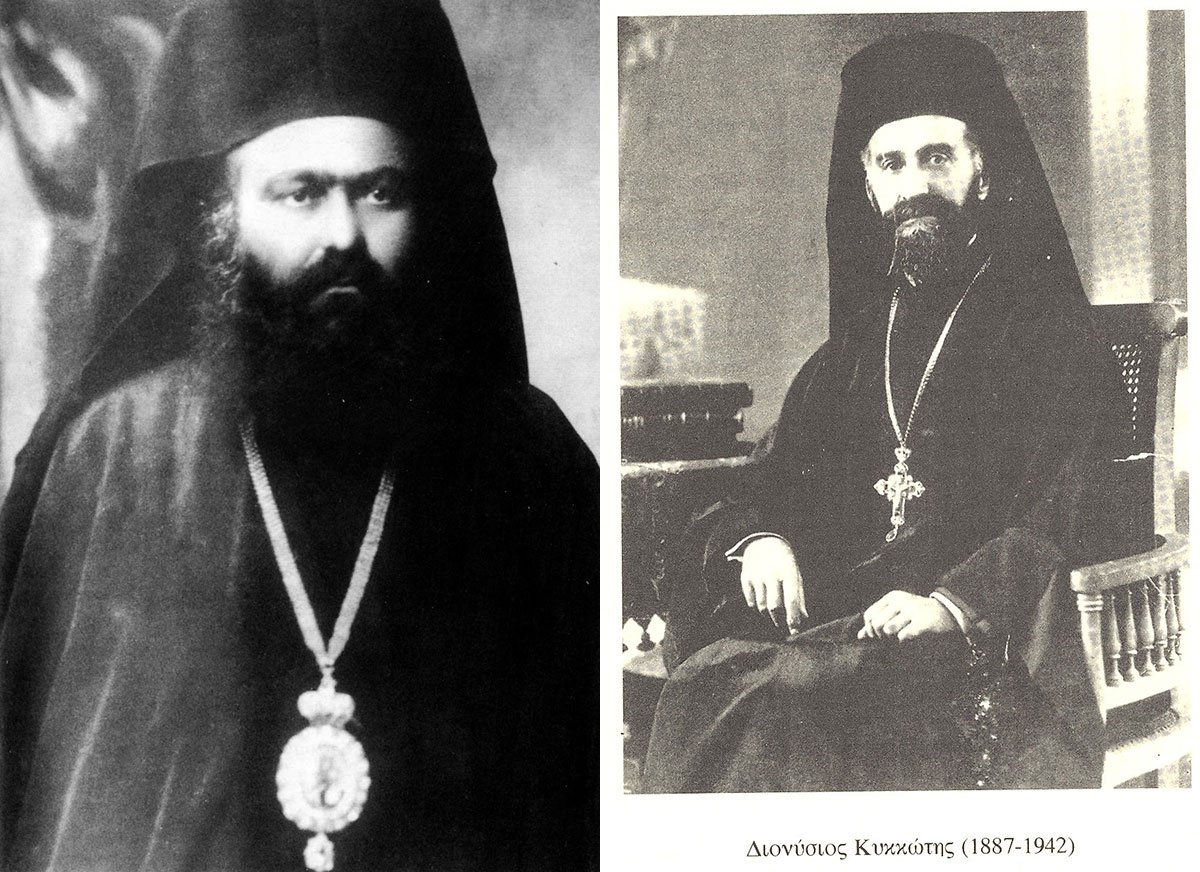
Ο μητροπολίτης Κιτίου Νικόδημος Μυλωνάς και ο αρχιμανδρίτης Διονύσιος Κυκκώτης. Εξορίστηκαν και οι δύο λόγω της συμμετοχής τους στα Οκτωβριανά.
"[...] Μάτην ο πλούτος χύνεται γύρω με σπατάλην· ο κύπριος διέρχεται αναίσθητος μπροστά εις τόσον μεγαλείον, εν υπομονή τρώγων τον άρτον της αθλιότητος και της πενίας εν αναμονή της μακαρίας επιβραβεύσεως των ουρανών ανθ’ όσων ενθάδε επείνασε. Τις η αιτία και τις ο υπεύθυνος;
Αλλά θα ήτο έργον ματαιοπονίας να ομιλήσει τις περί υπευθύνων. Εις τον μακάριον αυτόν τόπον ευθύναι ποτέ δεν ζητούνται, αν δε ζητηθούν ποτέ, θα ζητηθούν ―εστέ βέβαιοι― από όπου δεν υπήρξαν. Τόσον ο ραγιαδισμός εκυρίευσε την ψυχήν του αγρότου μας.
Θα ήτο δε αστείον να ομιλήσει κανείς περί ευθυνών και να επιχειρήσει τις υπεράσπισιν λαϊκών δικαιωμάτων εδώ, όπου η περί λαού αντίληψις εξισοί τούτον προς αμνόν άκακον αδιαμαρτυρήτως κειρόμενον. Εάν δε ποτέ ακούετε να γίνηται λόγος τις εν ονόματι των λαϊκών δικαιωμάτων να είσθε βέβαιοι ότι την στιγμήν εκείνην απεμπολούνται ταύτα αντί πινακίου φακής.
Τοιουτοτρόπως δε συμβαίνει ώστε, ενώ καθ’ εκάστην σχεδόν άνδρες βουληφόροι αναδεικνύονται δια της ψήφου του λαού, ίνα προστώσι τούτου εις όλας τας εκφάνσεις της ζωής, δεν βλέπομεν ουδέ καν ένα τούτων να κινηθεί, να ταχθεί ο πρωτοπόρος μιας πανστρατιάς νέων ανδρών, ήτις με τον πέλεκυν μιας νέας σκέψεως θα κόψει σύρριζα αιωνοβίους προλήψεις και δεισιδαιμονίας του λαού". (Απόσπασμα από το άρθρο "Η κατάσταση του λαού" που έγραψε τον... Οκτώβρη του 1917 ο Νικόδημος Μυλωνάς. Από το μπλογκ Λάρνακα, η πόλη του Ζήνωνα του Κιτιέα").
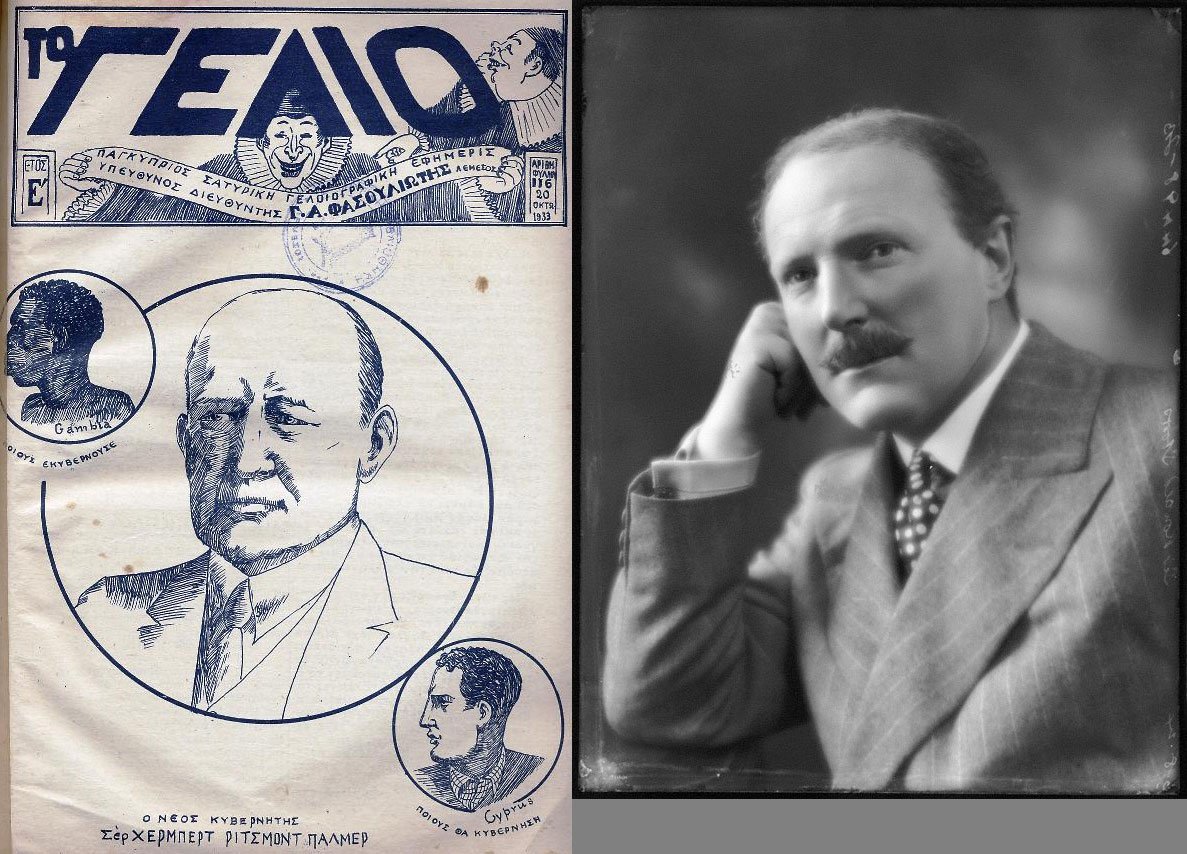
Η σατυρική εφημερίδα Το Γέλιο σχολιάζει την έλευση του νέου βρετανού κυβερνήτη στη θέση του Sir Ronald Storrs που είχε αναλάβει την καταστολή της εξέγερσης του 1931.
"In 1931, the Governor of Cyprus was Sir Ronald Storrs, a classically trained administrator with a love for all things Ancient Greek. Straight-backed, crisp and granite hard, he had been in Egypt with Kitchener and with Lawrence in Arabia. He was an archetypical autocrat and ran the island as his personal fiefdom.
Although Storrs' personal library and valuable art collection were destroyed in the fire that swept through Government House on the night of 21 October, he regarded these as lesser losses than his shattered and mistaken belief in the goodwill of the Greek Cypriots towards himself as an individual and the British as a whole.
But the truth is that by leading their comfortable life, the British had lost touch with their subjects and 'failed to notice the ground swell of dissatisfaction that was growing in the Greek Cypriot community, stirred by the Orthodox Church,' noted Nancy Crawshaw, the acclaimed author of The Cyprus Revolt. Another historian wrote: 'By allowing the Greek flag to fly in public, except on Government House, the Commissioners' residences and the Governor's car, the nationalists mistook this freedom for weakness.'
The British had allowed Greek schools to teach biased Greek history and geography. They had ignored anti-British articles in Greek Cypriot newspapers and the rabble-rousing at political meetings.
The young nationalists also believed Britain was on the point of financial collapse because the value of the pound had fallen dramatically after the Wall Street crash of 1929". (David Carter, "The 1931 Rebellion : A Week that shook Cyprus").
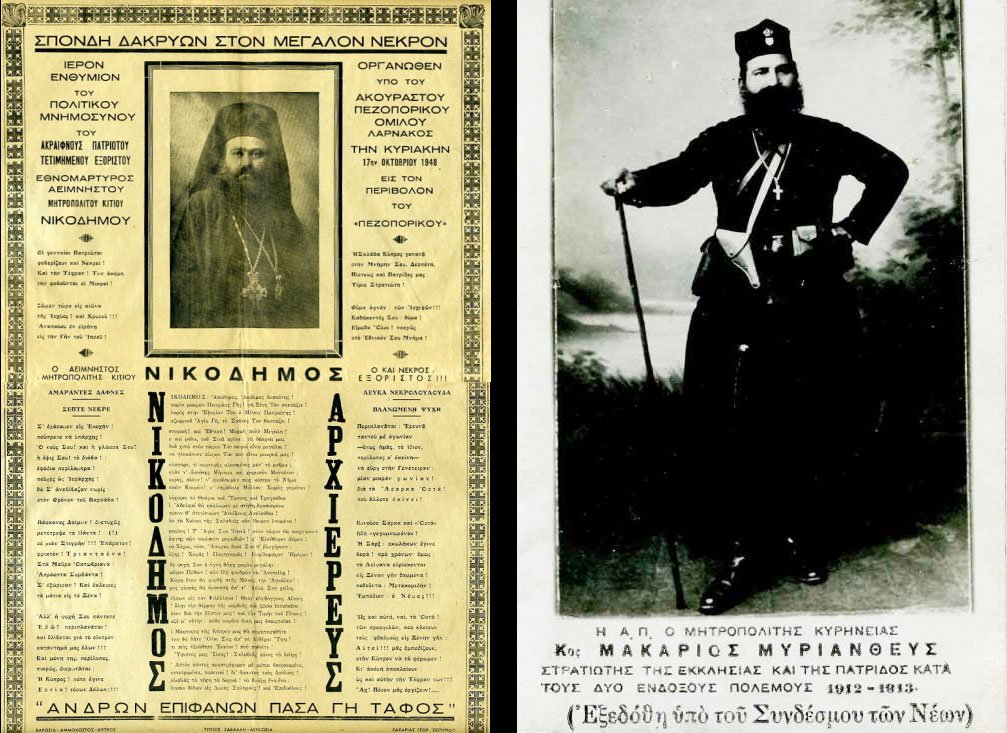
Ο μητροπολίτης Κυρήνειας Μακάριος Μυριανθεύς συνελήφθη στις 26 Οκτωβρίου του 1931. Εξόριστος, έμεινε στην Αθήνα μέχρι το 1946 (στο Παγκράτι). Επιστρέφοντας στην Κύπρο μετά τον πόλεμο, εξελέγη αρχιεπίσκοπος στις 24 Δεκεμβρίου του 1947 (ως Μακάριος Β').
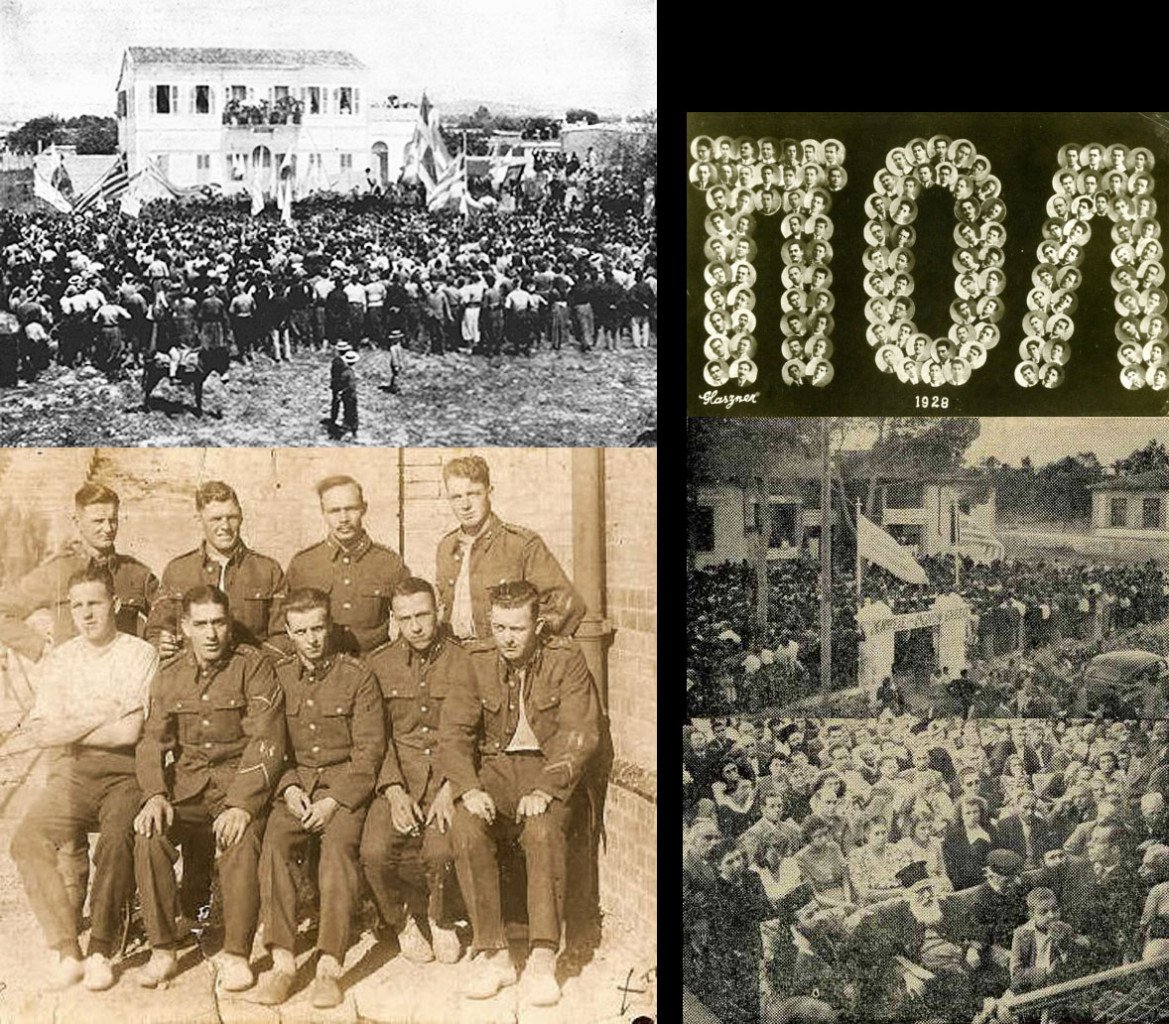
Συλλαλητήριο Ελληνοκυπρίων με ελληνικές σημαίες, βρετανοί στρατιώτες που εστάλησαν για να καταστείλουν την εξέγερση και πολιτικό μνημόσυνο για τον Νικόδημο Μυλωνά από τον ΠΟΛ (Πεζοπορικός 'Ομιλος Λάρνακας).
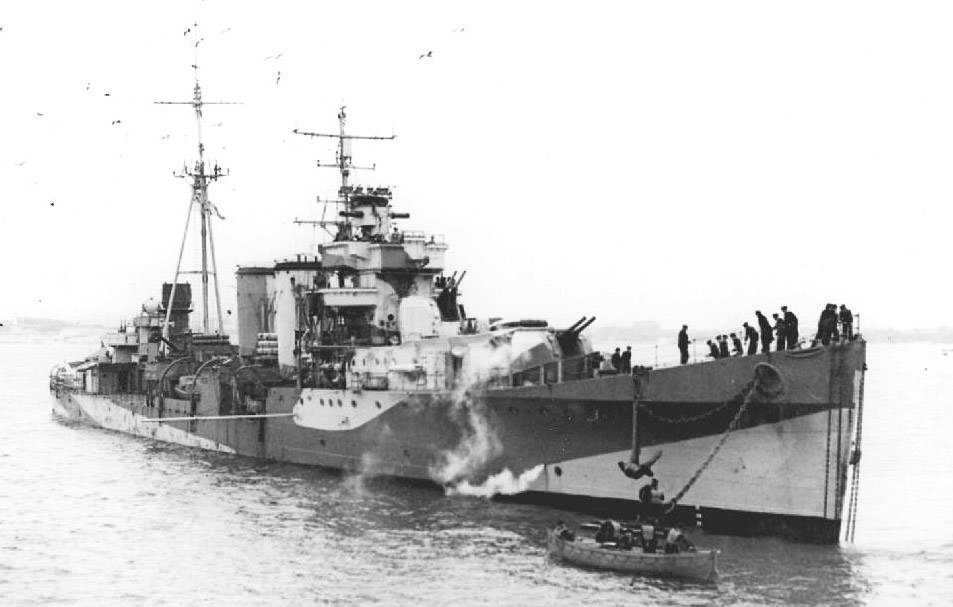
Το καταδρομικό HMS Colombo ετοιμάζεται να σαλπάρει από την Κρήτη για να κατευθυνθεί προς την Κύπρο.
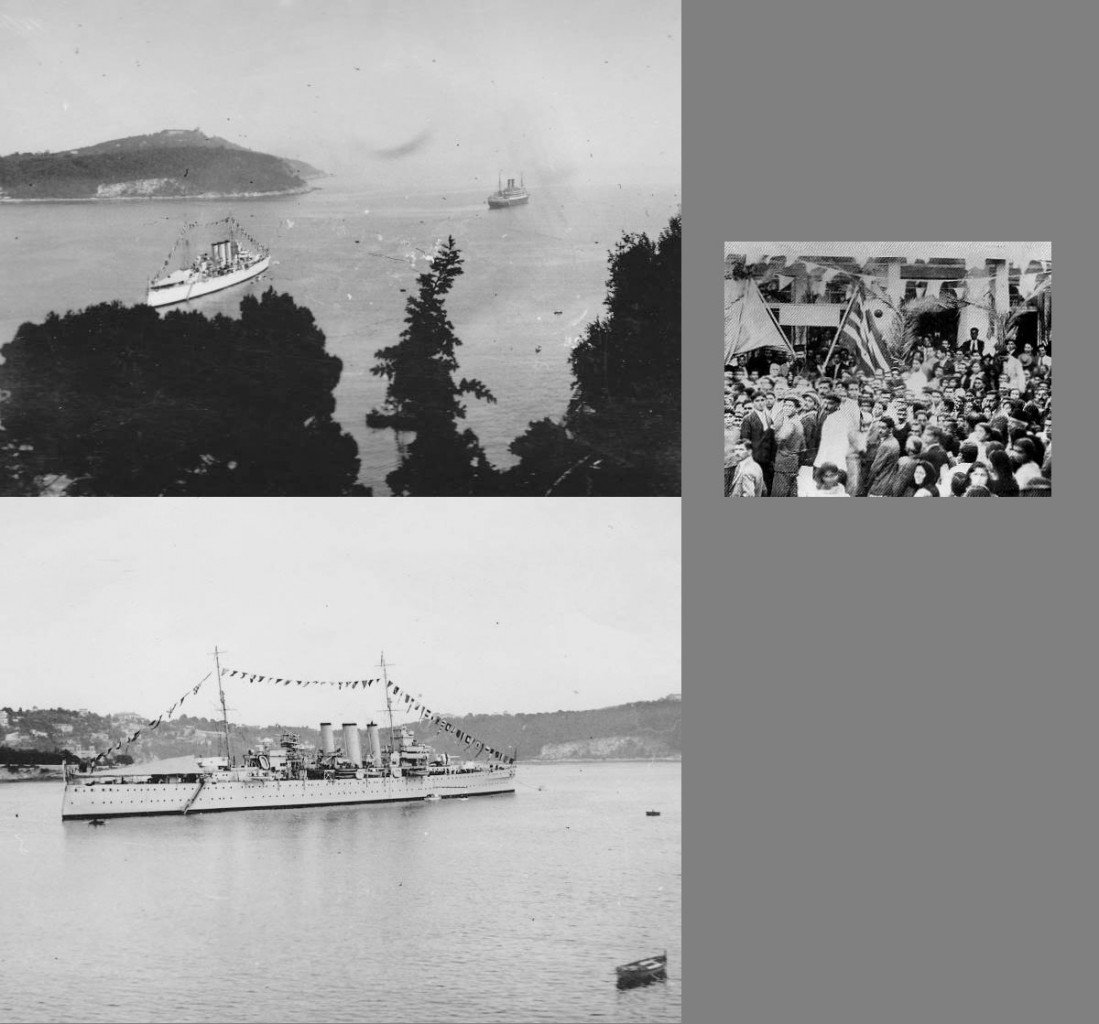
Το καταδρομικό HMS Shropshire παρέλαβε τον μητροπολίτη Κιτίου Νικόδημο Μυλωνά για να τον οδηγήσει στην εξορία.
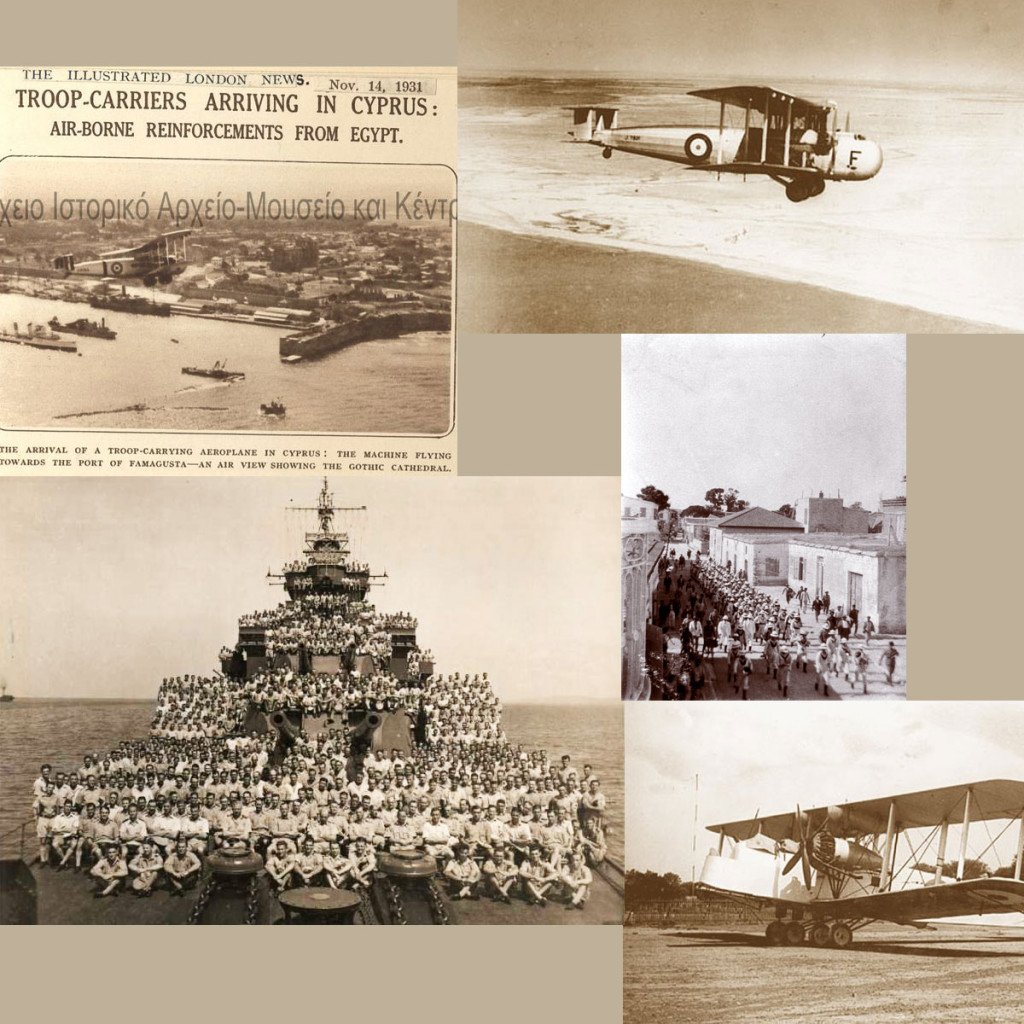
Οι Βρετανοί φέρνουν ενισχύσεις από την Αίγυπτο για ν' αντιμετωπίσουν την εξέγερση.
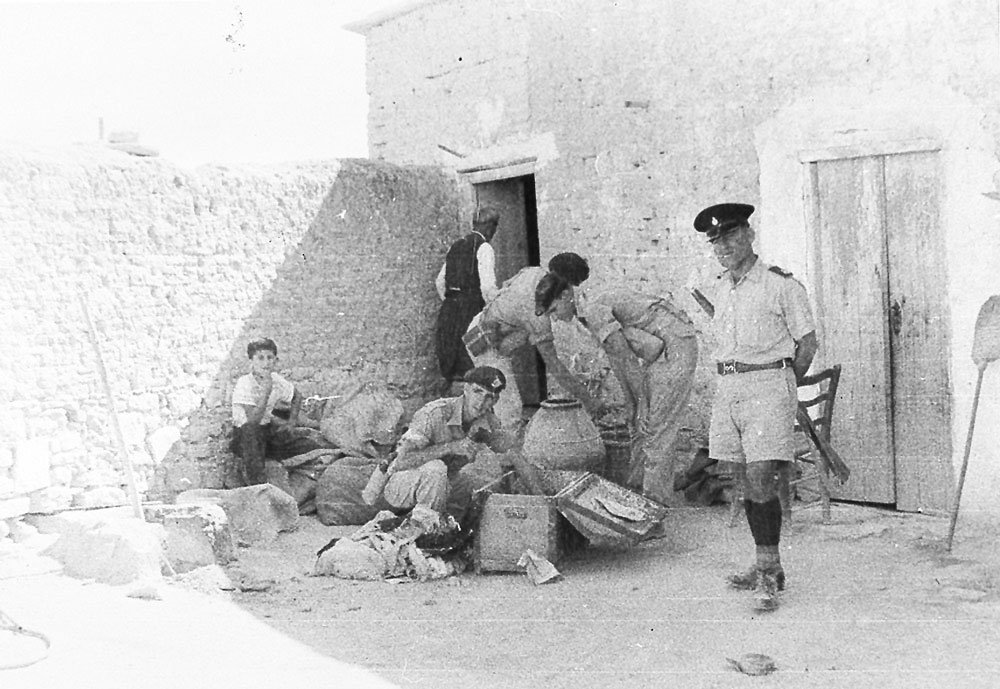
1957. Στρατιώτες του 1ου Τάγματος του Συντάγματος του Middlesex πραγματοποιούν έρευνα σε σπίτι.
Κύπρος 1931 - Τα Οκτωβριανά.
______________________
"The crash had led to increased taxes for the local population, which, by and large, had subsidence living. The new budget caused the Greek members of the Legislative Council to resign in protest. They set up the National Radicalist Union, whose aim was a 'fanatical pursuit of the union of Cyprus with the Greek political whole'. Meanwhile Nikodemos Mylonas, the Bishop of Kition was calling for the violent overthrow of the administration.British administrators, as was their custom, had spent the summer of 1931 in the Troodos Mountains to escape the oven-heat of the capital Nicosia. It was only when they returned in mid-September that they discovered for the first time just how active and successful in their absence the Greek Orthodox Church and local Greek Cypriot politicians had been in generating hostility towards their rulers.'Disobey the British'CYPRUS HAD become a powder keg of discontent. Only a spark was needed for it to explode. That spark was provided on 21 October. Spontaneous riots erupted in several towns almost simultaneously. Priests told the crowds that the Orthodox Patriarch of Cyprus had proclaimed the end of British rule and the union of Cyprus with Greece 'because the people will it!'Six members of the Cyprus Legislative Council vocally supported them. They denounced Storrs for enforcing an Order-in-Council, which overturned their earlier rejection of the new tariffs. 'Citizens! Greeks!' cried the disgruntled leaders, 'KATO OI TUPANNOl!' ('Down with the Tyrants!'), 'KATO OI XENOl!' ('Out with the Foreigners!')Three days earlier, in Larnaca, Bishop Nicodemus Mylonas had attacked the British administration of the island and called for 'disobedience and insubordination to the illegal laws of this immoral, vile, and shameful regime. For the benefit of this country we must not obey their laws. Do not be afraid because England has a fleet. We must all try for union and if necessary let our blood flow.'On 20 October, the Bishop arrived in Limassol. He had come, at the request of Mr. N K Lanitis, a leading nationalist. Church bells were rung to summon the people and a cortege, headed by a slowly moving motorcar draped with a large Greek flag, went out between 16.00 and 17.00 to meet him. He was thus escorted to the Stadium, where a crowd of about 3,000 people, including schoolboys, had assembled. After several speeches, the crowd moved off singing and cheering to a club in the town where, from a balcony, the Bishop again addressed them briefly in inflammatory terms.Storrs wrote later: 'Invective against British rule became more bitter and more direct in the political speeches, and vague incitement to unspecified deeds was more frequently included, with occasional references to the revolutionary example of other dependent countries. Among the peasantry the campaign of misrepresentation and abuse of Government had been favored by the deterioration of economic conditions and by rustic ignorance.'In the towns, generations of youth sedulously indoctrinated with disloyalty that had been launched by the secondary schools (permeated) all the professions. every branch of public life in the Orthodox community was in some way allied to the cause of union.'WEDNESDAY 21 OCTOBERThen, in the afternoon of 21 October Mr. Lanitis telegraphed Nicosia about the Limassol address by the Bishop. 'Never before has there been a more panegyric approval by town and district,' he exaggerated. The telegram was duplicated and distributed to supporters.'I declare enosis'AT THE Phaneromemi Church in the capital, Dionysios Kykkotis, the chief priest, read the telegram with glee and immediately rang the church bells, a signal for Greek Cypriots to gather. Within minutes, a large crowd arrived and unfurled a Greek flag, which the priest kissed. Now tempers were running high and the crowd decided to march on Government House, a mile and a half away. It was 18.45.'I proclaim the revolution,' shouted Kykkotis. 'I declare enosis.'The procession moved slowly in dense formation. Passing the Government timber yard, the Greek Cypriots helped themselves to sticks of various sizes. A breakaway crowd now moved off the main road and walked in a parallel procession through the suburban village of Ayii Omoloyitades.A patrol of five policemen watched the procession and reported its movements by telephone to Government House.At 19.45 advance elements of the crowd, carrying wooden staves, bicycle chains and lanterns, reached the first gate of Government House. Eight mounted police and a baton party of 12 police, with instructions to prevent the crowd from entering the grounds, met them. The police tried to push the crowd back, but were unsuccessful. The horses stampeded and the crowd poured in.Greatly outnumbered by the advancing crowd, the police were pushed back to the front doors of the house. Now the 5,000 demonstrators stopped and sang the Greek National anthem between choruses of 'Enosis!'At 20.20, Mr. Hart Davis, Commissioner of Nicosia, and Major A B Wright, Chief Assistant Secretary to the Government tried to address the crowd. They both agreed to meet three of the crowd's representatives to discuss grievances. Theofanis Theodotou, George Hajipavlou, Pheidias Kyriakides of Limassol and Kykkotis, the priest, struggled to the front of the mass, which enveloped the whole terrace and surrounding garden. A man carrying a trumpet and a large Greek standard accompanied them.At 20.45, a further 22 armed policemen began arriving in cars. Inspector Yianni commanded them. The inspector, using a devious route avoided the crowd and brought his men into Government House from the rear without opposition. He reported to the Commissioner at the porch. The Commissioner and leaders were then attempting to parley with the crowd, but their words were drowned in a cacophony of noise.'A few stones were thrown and some windows broken and, as I learnt afterwards, a Greek flag was hoisted on the roof of the house,' Storrs reported to London. 'It became increasingly clear that words would not move the crowd to disperse and that its enthusiasm and determination would not easily be exhausted.'The crowd began to throw stones at Hart Davis and Major Wright. With the police, they were driven from the porch into the house, where Police Inspector Faiz, a Turk, and 40 policemen had taken up positions.Further police reinforcements and a copy of the Riot Act were sent for.The bombardment of stones increased and soon all the windows in the front of the house had been smashed, a number of police were injured, many electric lights were broken and the telephone room, near the porch, had been wrecked and rendered untenable.About 21.30, the leaders, 'realizing that they had no control, and fearing the consequences, sent messages of apology to me and decamped,' Storrs claimed.The Riot Act is readMINUTES LATER Colonel Gallagher, the Police Commissioner, with a warning he would fire on the crowd if it did not disperse, read the Riot Act. His words were translated into Greek.The crowd stood its ground and stepped up its stone-throwing. 'Many of the stones or rocks thrown were larger than coconuts and some, propelled with slings, arrived with sufficient force to shatter the masonry of the porch and to break in the front door. The door was propped up with heavy furniture but was again smashed in by timber used as a battering ram,' said Storrs. 'To the occupants of the house the only clearly visible targets were the parties of youths in front. The roughs behind made occasional sallies to support them in destructive acts.'Unknown to the defenders, a very drunk Greek Cypriot - a Mr. Karakoushis from Ayios Dhometios - had entered the building from the rear. No one noticed him as he ripped paintings from the walls and fouled several rooms before heading for the Governor's State Room. Here he sat down in Storr's chair and shouted: 'Mother come and see your son who is now the governor.'Police reinforcements, so far held in reserve, arrived in four cars at the front of the house at 22.15. They entered through the broken windows, taking a battering from the stone-throwers. Their cars were set ablaze. Burning brands were lobbed through the broken windows of the House and fires took hold at six different places.'Open Fire!'COMMISSIONER Gallagher immediately told his 12 officers to prepare to shoot at the crowd. Each was told only one round per man was to be fired and they should aim at legs not the body. He took his men out from the back of Government House to the east side.'Open fire,' he shouted. The volley of shots followed immediately. The time was 22.35.The crowd scattered, pursued by the police. Two injured rioters were left on the ground. Seven others were wounded, one of whom, Onoufrios Clerides, 18, died.At 23.00, the police reported the grounds were clear. Almost simultaneously the flames from the curtains at the west corner of the frontage of the house spread to the roof and took hold of the whole building. Within five minutes, fire raged through Government House.The British civil servants fled. The Governor and Major Wright escaped through a tunnel at the side of the building, led by Inspector Faiz, a Turkish officer, and several of his men. They reached a dry riverbed, found a car and headed for the safety of the Secretary's Lodge in a car. For his gallantry, Faiz was awarded the King's Police Medal.(Editor's note: On 15 July 1974, during the coup against him, Archbishop Makarios III used the same method to save his life.)Next morning all that remained of Government House was a gutted, smoking ruin".
(David Carter, "The 1931 Rebellion : A Week that shook Cyprus", από το μπλογκ του Nicosia's Murder Mile).


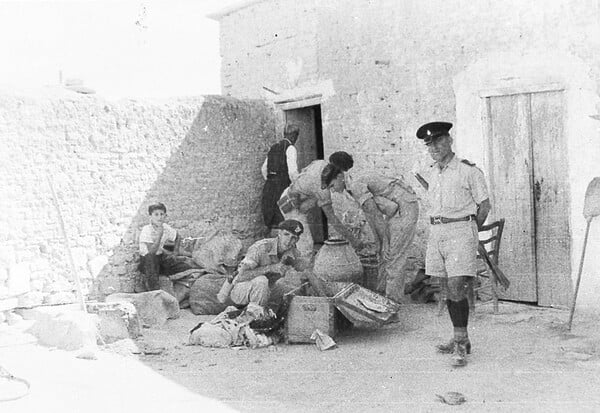











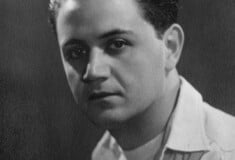










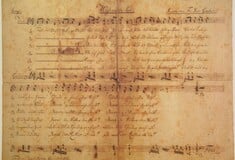
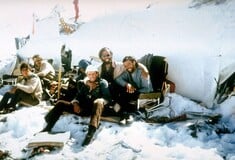



σχόλια